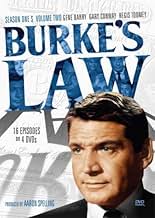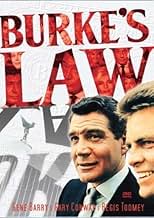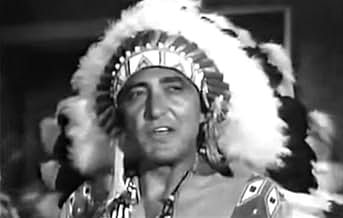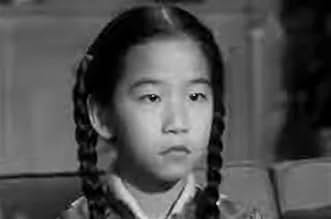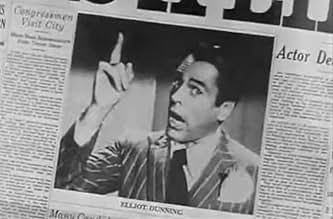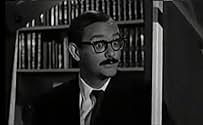VALUTAZIONE IMDb
7,3/10
1073
LA TUA VALUTAZIONE
Aggiungi una trama nella tua linguaThe millionaire captain of the LAPD homicide division is driven to the crime scenes in his 1962 Rolls-Royce by his loyal chauffeur.The millionaire captain of the LAPD homicide division is driven to the crime scenes in his 1962 Rolls-Royce by his loyal chauffeur.The millionaire captain of the LAPD homicide division is driven to the crime scenes in his 1962 Rolls-Royce by his loyal chauffeur.
- Premi
- 1 vittoria e 2 candidature totali
Sfoglia gli episodi
Recensioni in evidenza
The 64 black and white hour-long episodes of "Burke's Law" were originally broadcast from 1963-65 on ABC. The show then morphed into "Amos Burke, Secret Agent" for another 17 episodes during the 1965-66 season. And one episode "Who Killed the Jackpot" served as the introduction of the "Honey West" characters played by Anne Francis and John Ericson. Gene Barry played police captain Amos Burke, who headed up homicide while maintaining a lavish lifestyle; not because he was on the take but because he was already extremely rich and was just working for whatever intrinsic value the job provided. This was the main hook or novelty of the show, which was a weekly showcase of his lavish lifestyle (chauffeured limo with fully stocked bar, mansion, and a host of gorgeous women clamoring for his affections).
Although technically a mystery-adventure series there was a significant comedy element generated by the reactions of his detectives and his superior to Burke's displays of wealth and indulgence.
Barry was perfectly cast as the suave and sophisticated working playboy. Unfortunately the supporting cast was quite marginal and the writers never developed these secondary characters beyond the most superficial level. But this did allow room to showcase a multitude of guest stars and like "The Wild Wild West" many of these were Hollywood's hottest starlets. Especially memorable was former Miss America Mary Ann Mobley whose unexpected chemistry with Barry led to multiple appearances during the course of the series.
Unlike "Columbo", the series withheld the identity of the killer from viewers until the end although it was not disclosed in the standard "Murder She Wrote" moment of revelation. The huge popularity of "James Bond" and "The Man From UNCLE" caused producer Aaron Spelling to introduce a secret agent formula into the final season. Unfortunately what had been a unique cop show became just another silly spy series and it expired after just half a season.
Then again, what do I know? I'm only a child.
Although technically a mystery-adventure series there was a significant comedy element generated by the reactions of his detectives and his superior to Burke's displays of wealth and indulgence.
Barry was perfectly cast as the suave and sophisticated working playboy. Unfortunately the supporting cast was quite marginal and the writers never developed these secondary characters beyond the most superficial level. But this did allow room to showcase a multitude of guest stars and like "The Wild Wild West" many of these were Hollywood's hottest starlets. Especially memorable was former Miss America Mary Ann Mobley whose unexpected chemistry with Barry led to multiple appearances during the course of the series.
Unlike "Columbo", the series withheld the identity of the killer from viewers until the end although it was not disclosed in the standard "Murder She Wrote" moment of revelation. The huge popularity of "James Bond" and "The Man From UNCLE" caused producer Aaron Spelling to introduce a secret agent formula into the final season. Unfortunately what had been a unique cop show became just another silly spy series and it expired after just half a season.
Then again, what do I know? I'm only a child.
I was born in the 1960s and had never heard of this gem until I found it online recently. And I have to say that I'm very pleasantly surprised. It's about a Millionaire homicide Chief (inheritance from his father). Each episode takes us through a new killing where the Chief and his trusty chauffer and sidekicks solve a murder. There are so many of the old TV stars here. I've seen Sammy Davis Jr., Zsa Zsa Gabor, William Shatner, Annette Funicello, James MacArthur, and many others that I can't quite recall their names. It's a great watch for anyone who appreciated these classic series.
I never heard of this until 9 years ago and saw an episode posted on the Internet Archive and it was described as being the episode bumped to the following week because it was to air the night of the Kennedy assassination. It was interesting enough but I forgot the show and didnt think much of it until I started seeing old movies and Gene Berry started turning up in alot of them in varying roles, The Houston Story (sympathetic bad guy), Naked Alibi (sociopath) and the most memorable for me was the overlooked Samuel Fuller movie, China Gate where he plays an antihero mercenary (also Nat King Cole acted great and its the best thing I ever saw Angie Dickinson do).
This show has a really great first two seasons. Amos Burke is a suave and wealthy LA homicide detective. Someone with a sharp eye and quick wit. A welcome change from some of the villains Berry has played in those Noir movies. The stories are interesting with good twists and all had titles begining with "Who killed...."
I loved the format but I guess the ratings were luke warm hence the complete change in storyline to capitalize on the mid 60s secret agent craze. Those episodes lost the charm the first two seasons had. Instead it was lightweight Americanized made for TV James Bond type entertainment. Maybe the writing was still good but the format isn't to my liking. Thpse shows were too common and they were like westerns in the 1950s. On everywhere.
With the benefit of not having nostalgia for this show, I can see it in a modern way and I notice these types of cop shows were fairly unique then and still so now. If they thought to set Burkes Law in Hawaii, there may never have been a Steve McGarratt or Hawaii Five-O or Amos Burke-Secret Agent.
This show has a really great first two seasons. Amos Burke is a suave and wealthy LA homicide detective. Someone with a sharp eye and quick wit. A welcome change from some of the villains Berry has played in those Noir movies. The stories are interesting with good twists and all had titles begining with "Who killed...."
I loved the format but I guess the ratings were luke warm hence the complete change in storyline to capitalize on the mid 60s secret agent craze. Those episodes lost the charm the first two seasons had. Instead it was lightweight Americanized made for TV James Bond type entertainment. Maybe the writing was still good but the format isn't to my liking. Thpse shows were too common and they were like westerns in the 1950s. On everywhere.
With the benefit of not having nostalgia for this show, I can see it in a modern way and I notice these types of cop shows were fairly unique then and still so now. If they thought to set Burkes Law in Hawaii, there may never have been a Steve McGarratt or Hawaii Five-O or Amos Burke-Secret Agent.
I actually laugh out loud watching this tongue-in-cheek cop show. It never took itself seriously and the guest stars loved hamming it up. A long list of Silver Age screen stars and future T.V. stars kept things moving at a brisk pace. Many you'll recognize just before they became TV', most famous stars. William Shatner, Elizabeth Montgomery, and many others. It even took pot-shots at it's own formula. For example in one episode the culprit makes a dash for the stairs to escape and is admonished by Amos Burke as 'Not that old cliché" or lines like "You've been watching too many cop shows on TV." A revival was attempted in 1984 but didn't hit all the right notes. Sexist by today's standards in the way Burke treated his lady friends, but it was a product of it's time. But of course if Burke ever became serious that would take away from his duties which Burke took very seriously. They couldn't make the show today without taking away it's dated charm. Don't forget Captain Amos Burke (Gene Barry) could SING too.
TV actors, at least in the old days when they were placed in a separate class from movie actors, often seemed to be clones of their movie brethren. Some were singular in their associations. Nehemiah Persoff seemed to be the Edward G. Robinson of television, getting similar roles and acting them in a very similar manner. Carolyn Jones was the Bette Davis of TV, even to the point of playing a set of sisters one of whom is a murderer on Burke's Law. Other's had company in their pursuits. The western stars were all either John Wayne or Gary Cooper, with an occasional Jimmy Stewart or Henry Fonda thrown in, (including the real thing on "The Deputy"). There were a whole selection of Clark Gables, including John Russell, Rory Calhoun, Richard Egan , Robert Lowery and others. There were plenty of Brandos, including Burt Reynolds, George Maharis and John Saxon. There were enough Rock Hudsons to fill a theater, with John Gavin, Tom Tryon and Gardner McKay coming immediately to mind. The blonde versions I call the "Redfords", a group of thoughtful , well educated types of which Robert Redford was one along with James Franciscus, Richard Chamberlain and William Shatner. They had varying degrees of success with Redford emerging as the head of the class.
Perhaps the most successful strain, however were the Cary Grants. Grant made an ideal model for the suave detective hero, able to be charming or tough as the occasion demanded. Craig Stevens was hired to play Peter Gunn specifically because of a strong resemblance to Grant. His tightlipped performance was not really very charming but it's surely how Cary would have played that character. Latern-jawed John Vivyan played a role that Grant had actually essayed in the movies, Mr. Lucky. He was competent at best. The heroes of the Warner Brother's detective shows were largely based on Cary Grant. Ephram Zimbelist Jr.'s Stu Bailey was a grant-style role with a lot more charm than Peter Gunn. Richard Long's Rex Randolph on Bourbon Street Beat was much the same. Anthony Eisley's Tracy Steele was a less convincing version of the same character on Hawaiian Eye.
But the best of the Grant clones was Gene Barry. He was male-model handsome, had good breeding and seductive whiskey voice. He was also TV's greatest reactors. He had a series of comic takes that was perfect for Amos Burke, who had to confront an unending series of eccentric subjects. Yet he could turn around and romance the ladies or get tough with the tough guys. And he was a good enough actor to hold up his end when the heavy dramatics intervened.
One wonders what the originals of these clones must have thought as they watched the boob tube in it's infancy.
Perhaps the most successful strain, however were the Cary Grants. Grant made an ideal model for the suave detective hero, able to be charming or tough as the occasion demanded. Craig Stevens was hired to play Peter Gunn specifically because of a strong resemblance to Grant. His tightlipped performance was not really very charming but it's surely how Cary would have played that character. Latern-jawed John Vivyan played a role that Grant had actually essayed in the movies, Mr. Lucky. He was competent at best. The heroes of the Warner Brother's detective shows were largely based on Cary Grant. Ephram Zimbelist Jr.'s Stu Bailey was a grant-style role with a lot more charm than Peter Gunn. Richard Long's Rex Randolph on Bourbon Street Beat was much the same. Anthony Eisley's Tracy Steele was a less convincing version of the same character on Hawaiian Eye.
But the best of the Grant clones was Gene Barry. He was male-model handsome, had good breeding and seductive whiskey voice. He was also TV's greatest reactors. He had a series of comic takes that was perfect for Amos Burke, who had to confront an unending series of eccentric subjects. Yet he could turn around and romance the ladies or get tough with the tough guys. And he was a good enough actor to hold up his end when the heavy dramatics intervened.
One wonders what the originals of these clones must have thought as they watched the boob tube in it's infancy.
Lo sapevi?
- QuizFor the show's final season in 1965 - 66, the format was completely changed in order to capitalize on the popularity of spy shows like "Organizzazione U.N.C.L.E. (1964)," with Amos Burke himself becaming a secret agent. The title of the series was changed accordingly: "Amos Burke - Secret Agent." But the new format proved unpopular, and the show was cancelled.
- Curiosità sui creditiIn the opening credits, the title of the show was always announced by the voice of a woman saying, VERY seductively, "Burke's Law".
- Versioni alternativeSome "Amos Burke, Secret Agent" syndication prints retain that title sequence, but with the title changed to "Burke's Law" and a male announcer speaking the title (as with the original "Amos Burke, Secret Agent" episodes).
- ConnessioniFollowed by La legge di Burke (1994)
I più visti
Accedi per valutare e creare un elenco di titoli salvati per ottenere consigli personalizzati
- How many seasons does Burke's Law have?Powered by Alexa
Dettagli
- Data di uscita
- Paese di origine
- Lingua
- Celebre anche come
- La legge di Burke
- Luoghi delle riprese
- Aziende produttrici
- Vedi altri crediti dell’azienda su IMDbPro
- Tempo di esecuzione50 minuti
- Colore
- Proporzioni
- 1.33 : 1
Contribuisci a questa pagina
Suggerisci una modifica o aggiungi i contenuti mancanti





